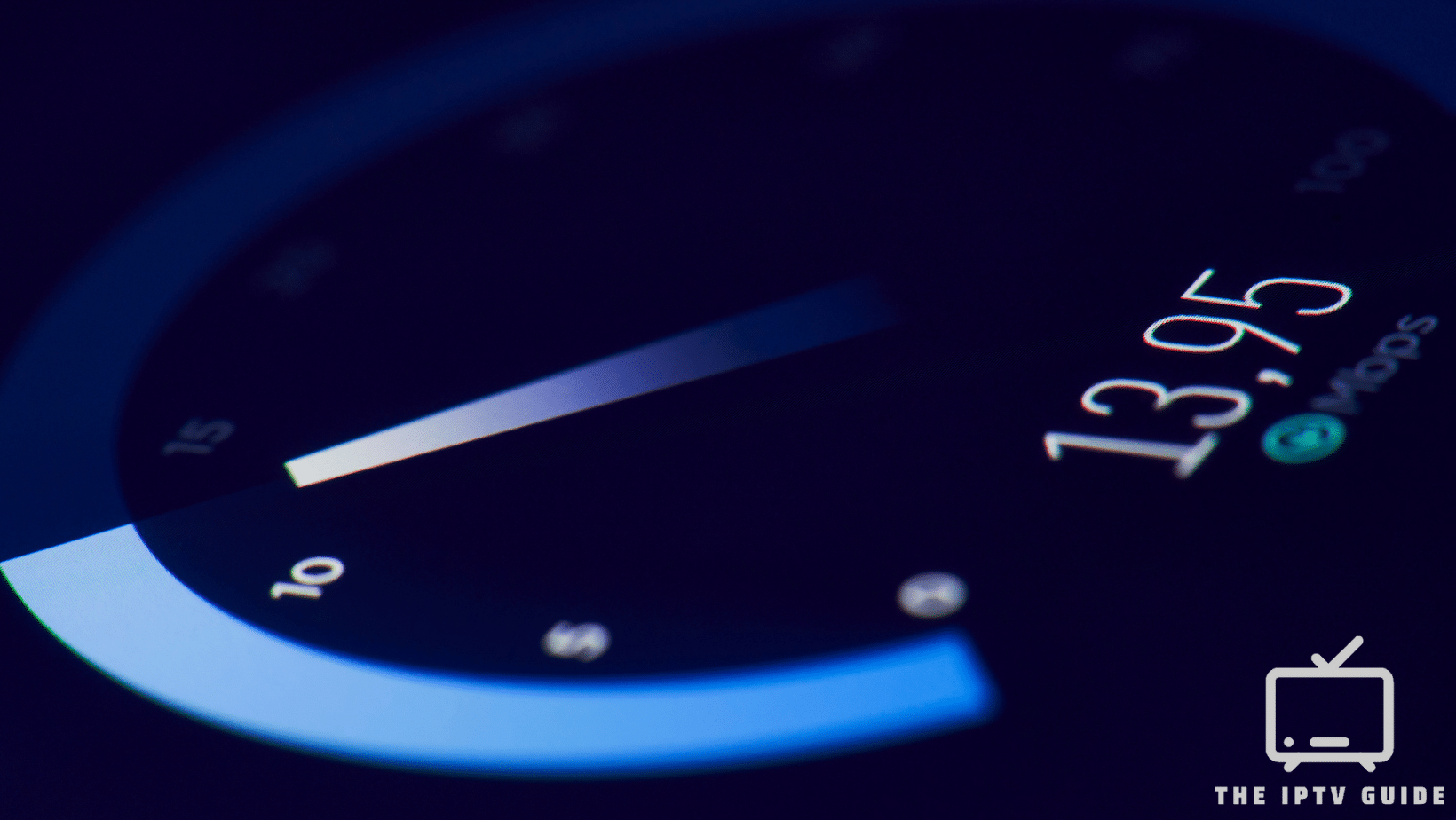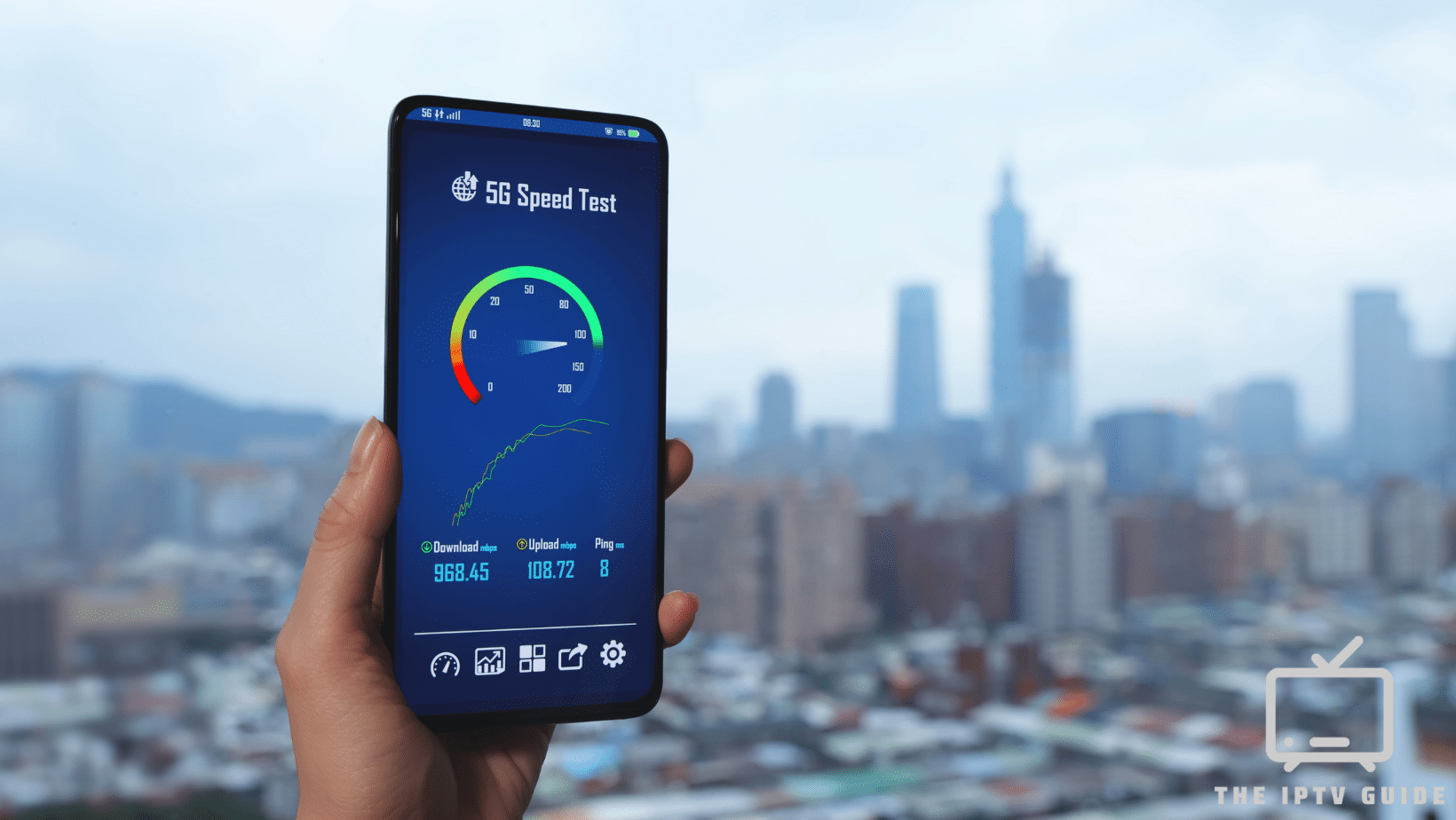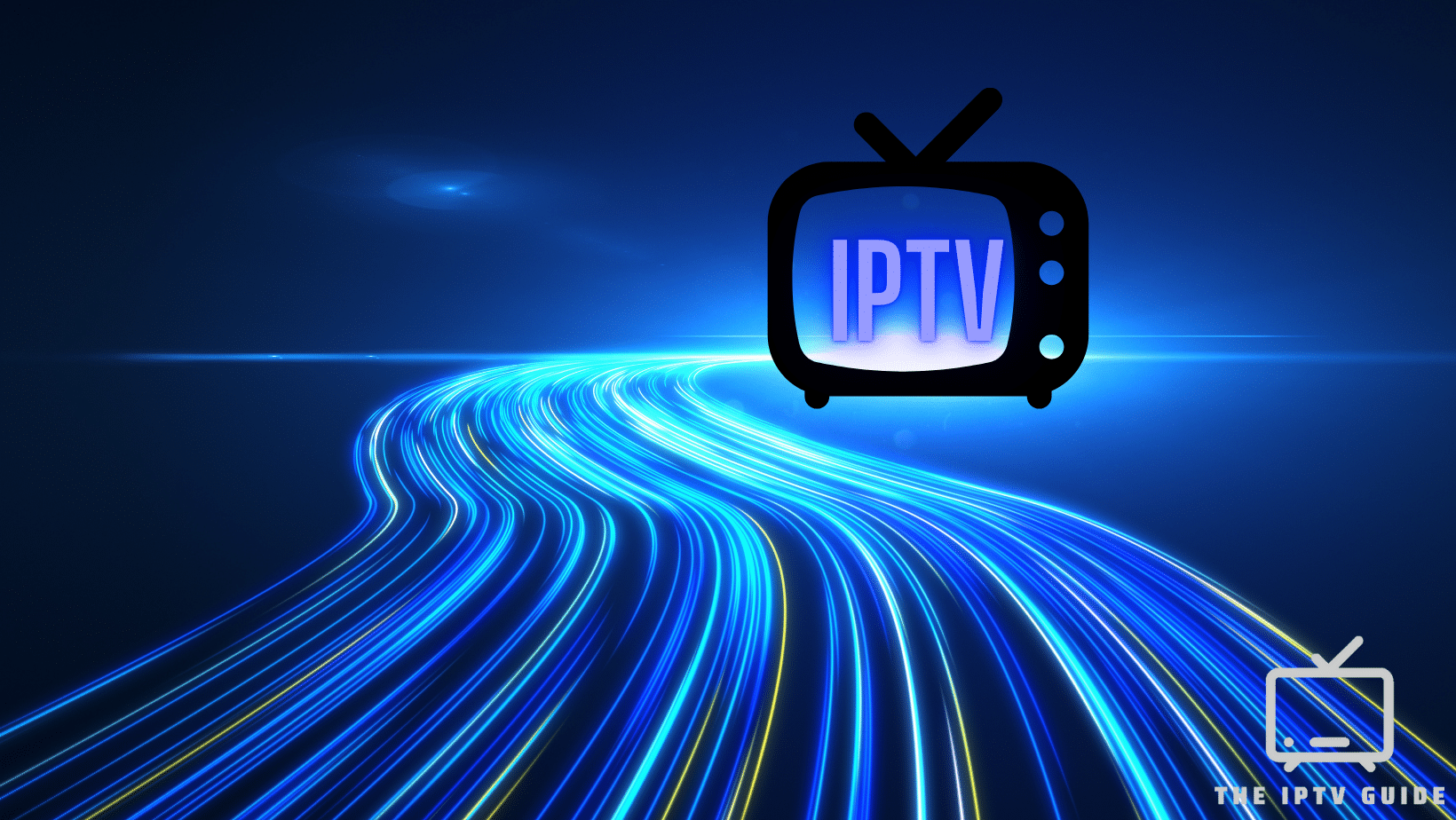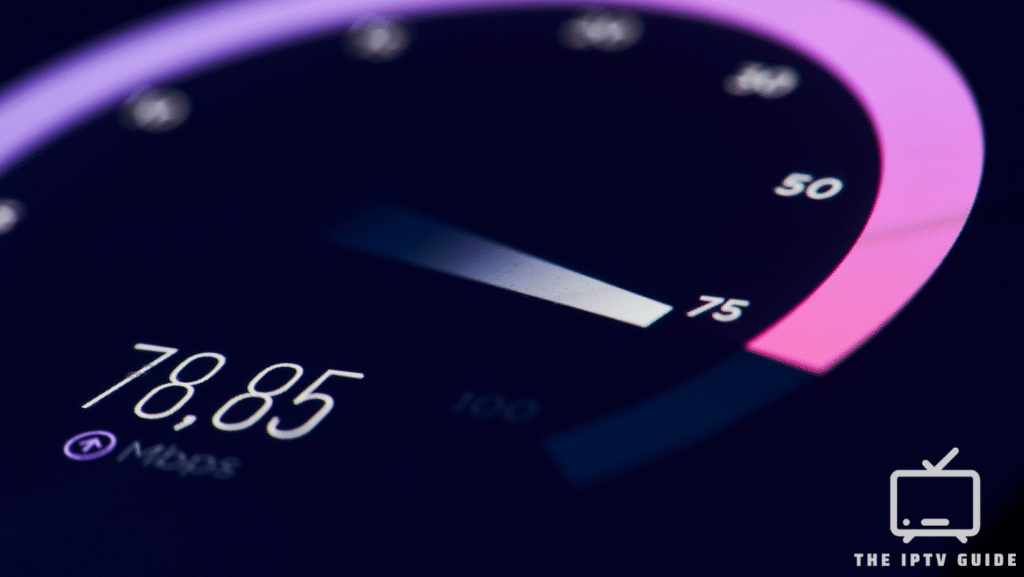Everything is online these days. Well, you already know that, since you’re reading a blog about how to get the best IPTV service! But if you’re faced with the dreaded buffering while watching your fave show, then you might be facing problems with your IPTV bandwidth requirements.
While, of course, the caliber of your chosen IPTV provider will play some part in the actual streaming quality, buffering and other playback issues, it’s important to factor in your internet connection.
It’s called internet protocol television, after all. While good IPTV systems deliver a huge range of channels and events, they can only do so if you’ve got a network connection set up with the minimum speed required.
Why IPTV Bandwidth Requirements Matter for Streaming
Unlike traditional broadcast methods, IPTV relies entirely on your internet connection to deliver content. This means the speed and stability of your internet connection directly impact the quality of your viewing experience.
Buffering, lag, and pixelated images are common problems caused by insufficient bandwidth or unstable connections. You might find that channels don’t load properly and you have issues connecting to pay-per-view or live events.
Understanding Bandwidth vs Internet Speed

Before discussing specific requirements, it’s important to understand what bandwidth and internet speed mean in the context of IPTV services.
You’ll need to know what you’re looking for if you’re starting with a new provider or checking that your current deal has enough speed and strength to provide the very best high quality video experience.
Bandwidth
Bandwidth refers to the maximum amount of data your internet connection can handle at any given time. It’s measured in megabits per second (Mbps). The higher the bandwidth, the more data your connection can transmit simultaneously.
Internet Speed
Internet speed is how fast your connection can upload or download data. For IPTV streaming, download speed is the key factor because it determines how quickly content can be delivered to your device. Some service providers may specify a minimum internet speed required for their programming.
Both bandwidth and speed play a crucial role in ensuring smooth IPTV streaming.
Why Bandwidth Matters for Streaming
Along with video quality, the amount of bandwidth available directly affects your streaming experience. With sufficient bandwidth, you can enjoy high-definition and even 4K content without interruptions. Insufficient bandwidth, on the other hand, can lead to buffering and reduced video quality, severely impacting your overall enjoyment.
Connection Types and Their Impacts
Before you choose an IPTV provider, it’s crucial to understand how different connection types can affect your streaming speeds. Here’s a breakdown of various connections:
| Connection Type | Speed Range |
| Cable | 10 – 1000 Mbps |
| Fiber | 50 – 2000 Mbps |
| DSL | 1 – 100 Mbps |
| Satellite | 12 – 100 Mbps |
| Mobile Data | 5 – 100 Mbps |
Impacts on your streaming performance vary widely depending on the connection type you use. Each type comes with its own set of advantages and challenges. For example, fiber offers exceptional speed, while DSL may not keep up with high-demand usage.
- Fiber connections provide the fastest speeds and are optimal for heavy streaming.
- Cable connections can be reliable but often share bandwidth with others.
- DSL connections are widely available but may limit your streaming quality.
- Satellite connections can offer decent speed but generally face latency issues.
- Mobile Data connections are convenient but not always consistent.
Perceiving the differences in speed between connection types is vital as each can dramatically influence your IPTV quality and performance.
Implications of Low Bandwidth on Viewing Experience
Bandwidth limitations can severely affect your viewing experience. You might encounter frequent buffering, lower video quality, or even complete interruptions during playback.
In addition to causing annoyance, low bandwidth can degrade your enjoyment of shows and movies, leading to dissatisfaction. If you’re streaming live events, buffering can result in missing key moments. It’s crucial to ensure that your internet speed aligns with your streaming needs to avoid these negative consequences.
What’s the Minimum Internet Speed Required for IPTV?

So, now we’ve defined our terms, let’s get started with understanding what you need to look for from your internet service provider to guarantee optimal performance.
There are a few factors that play into getting the best set up and performance for your streaming services.
For one, you’ll need to factor in the number of devices connected to your access network. It makes sense that if you’ve got dozens of smart phones, laptops, smart TVs, set top box devices and games consoles eating up bandwidth usage, things will get slower.
Also think about the resolution of whatever content you’re streaming. Here’s a general guideline:
- Standard Definition (SD): Requires at least 3-5 Mbps per stream.
- High Definition (HD): Requires at least 8-10 Mbps per stream.
- 4K Ultra HD: Requires at least 25 Mbps per stream.
Keep in mind that these are just the minimum requirements. If multiple devices are streaming or using the internet simultaneously, you’ll need a higher overall speed to ensure smooth performance.
IPTV provider recommendation
LayersevenTV, a leading IPTV service provider, recommends a minimum internet speed of 15 Mbps for HD streaming and 35 Mbps for 4K content to guarantee a seamless experience. Their platform is optimized for high-quality streaming, making it an excellent choice for reliable streaming quality across multiple streams.
How Much Bandwidth Does IPTV Use?
Once again, understanding the bandwidth requirements for IPTV is necessary for ensuring a smooth streaming experience. IPTV typically requires a specific amount of bandwidth depending on the quality of the stream and the number of devices being used simultaneously. The good news is that you can easily estimate how much bandwidth you need for your household when using IPTV services.
Estimating Bandwidth per Stream
Below are some general guidelines for estimating bandwidth per stream. Standard-definition (SD) channels typically require about 3-4 Mbps, while high-definition (HD) channels usually need around 5-8 Mbps. For ultra-high-definition (UHD or 4K) TV, the requirement jumps to about 25 Mbps. By recognizing these figures, you can gauge how much bandwidth you’ll need for your anticipated viewing activities.
Total Household Bandwidth Considerations
Between your IPTV needs and other online activities, it’s important to assess your total household bandwidth. The total number of devices actively using the internet can significantly affect performance. You should account for smartphones, laptops, and other smart devices that often connect to your network simultaneously.
IPTV can demand significant bandwidth especially when multiple users are streaming at once. This means if you have several devices connected to your network—whether for work, gaming, or even casual browsing—you could face bandwidth congestion. Ensuring that your internet speed accommodates both your IPTV needs and other usage will empower your entire household to enjoy a seamless experience.
Bandwidth Consumption for Different Channels
Consumption patterns can vary based on the channel you are watching. Certain channels, especially those that feature immersive content or high-action scenes, may use greater amounts of data than others.
It is important to note that popular channels or live sports broadcasts often require more bandwidth, leading to higher consumption rates. By keeping an eye on what channels you frequently watch, you can make a better-informed decision about your total bandwidth needs. A dedicated internet plan that supports your viewing habits will enhance your IPTV enjoyment, ensuring crisp quality without interruptions.
IPTV Bandwidth Requirements by Resolution
Despite the wide spectrum of IPTV providers available, understanding the bandwidth requirements for different resolutions is vital for an optimal viewing experience. Your internet speed plays a significant role in ensuring smooth playback, with varying needs based on the content quality you desire.
Standard Definition (SD) Bandwidth Needs
Across the board, to stream Standard Definition (SD) content, you typically require a minimum of 3 Mbps. This lower bandwidth is generally suitable for basic viewing but may struggle during peak hours or multiple device usage.
High Definition (HD) Bandwidth Requirements
Requirements for High Definition (HD) streaming are much higher, often necessitating 5 to 8 Mbps. To ensure that you enjoy your shows without interruptions, a consistent internet connection at this speed or higher is recommended.
High Definition content enhances your viewing experience with greater detail and clarity. However, it’s imperative to maintain a stable connection above 8 Mbps when multiple devices are streaming simultaneously. Otherwise, you risk buffering issues that diminish your enjoyment.
Ultra High Definition (4K) Bandwidth Demands
By opting for Ultra High Definition (4K) content, your bandwidth needs increase significantly, often requiring at least 25 Mbps. This speed ensures that you can enjoy crystal-clear images without any delays or buffering.
Resolution at 4K requires a robust internet connection, as the data transmitted is substantially larger than both SD and HD formats. Your network should ideally support an even higher speed to allow for multiple users and devices without compromising performance. Aim for a minimum of 25 Mbps to maintain seamless streaming quality.
IPTV Bandwidth Calculator
Many users underestimate the importance of calculating the appropriate bandwidth for their IPTV needs. An IPTV bandwidth calculator can help you determine the minimum internet speed required to enjoy seamless streaming without interruptions. This section will guide you through the available tools and provide sample calculations to find the best fit for your viewing habits.
Tools for Estimating Total Bandwidth Usage
Before plunging into calculations, consider using online tools specifically designed for estimating your total bandwidth usage. These calculators allow you to input various factors such as the number of devices, streaming quality, and the duration of usage. By doing so, you’ll gain a clearer understanding of the bandwidth you require to keep your IPTV experience smooth and enjoyable.
Sample Calculations for Various Scenarios
Bandwidth requirements can vary greatly based on your specific setup. For a single device streaming in HD, you typically need around 5 Mbps. If you have multiple devices or plan to stream in 4K, you might need upwards of 25 Mbps or more, depending on how many streams you want to run simultaneously.
In addition, if you have a household with multiple users and devices, it’s vital to consider the cumulative bandwidth. For instance, if you have three devices streaming HD content while someone else is browsing, it is wise to calculate at least 15 to 20 Mbps as a buffer to accommodate additional internet use and ensure smooth playback.
Understanding Multicast vs. Unicast Bandwidth Needs
The distinction between multicast and unicast data streaming can significantly impact your bandwidth requirements. Multicast delivers a single stream to multiple users simultaneously, reducing the overall bandwidth use, while unicast sends individual streams to each user, which can increase the bandwidth demand considerably.
Various IPTV providers may use either method, so it’s vital to know how your provider operates. In situations where you are using unicast, as more users connect, your bandwidth needs will grow drastically, while with multicast, your connection remains more stable and efficient, making it a more favorable option for large households or communities. Understanding this can aid you in choosing the right service for your bandwidth capacity.
Low Bandwidth IPTV: Can It Work?
Now, many people wonder if low bandwidth IPTV can actually deliver a satisfying viewing experience. Low bandwidth IPTV typically refers to streaming services that require a less demanding internet speed, generally around 1 to 3 Mbps. These services aim to minimize buffering and allow for smoother playback, making it a viable option for those with limited internet connections.
Defining Low Bandwidth IPTV
For those unfamiliar, low bandwidth IPTV is designed to function effectively with lower data speeds. It utilizes efficient compression techniques to deliver video content without consuming extensive internet resources. This means you can still enjoy your favorite shows even if your internet speed isn’t the fastest.
Recommended Low Bandwidth IPTV Services
For the ideal low bandwidth IPTV experience, consider services like Pluto TV, Sling TV, and Layerseven IPTV. These platforms are known for their efficient streaming options and can work well even with slower connections, making them accessible to a wider audience.
Bandwidth requirements for these recommended services are intentionally kept low to cater to users with limited internet infrastructure. This allows you to enjoy uninterrupted streaming on devices like your smartphone, tablet, or smart TV, even if your internet connection ranges from as little as 1 Mbps.
Strategies to Optimize IPTV Performance on Low Bandwidth
To enhance your IPTV experience on low bandwidth, focus on optimizing your home network. This might involve reducing the number of devices connected to your Wi-Fi or prioritizing your streaming device’s bandwidth. Taking these steps can significantly improve your viewing experience.
Plus, consider scheduling your TV time during off-peak hours when internet traffic is lighter in your area. This will help alleviate potential congestion on your network, leading to a more enjoyable streaming experience. You might also look into using ethernet connections instead of Wi-Fi, as they typically offer more stable speeds.
How to Test Your Internet Speed

Before subscribing to an IPTV service, it’s a good idea to test your network’s speed to make sure you’ve got the minimum internet speed required for streaming.
To check, you can use one of several free tools available online. We’ve tried Speedtest.net and Fast.com, but there are lots available. They all measure your connection’s download and upload speeds so you can make sure you’re IPTV streaming-ready.
Recommended Steps:
- Close all unnecessary applications and disconnect other devices using your internet connection.
- Run a speed test on the device you plan to use for IPTV streaming.
- Compare your results with the recommended speeds for the resolution you’re targeting.
Factors That Can Affect Bandwidth Usage

So, what can you do to guarantee the best possible connection speed and streaming quality? Of course, some things will be out of your control. Sometimes, the service might experience downtime or an outage. Or, bad weather might affect your overall connection.
But, there are a few things you’re in control of that can make or break the quality of streaming TV you get. Get yourself a smooth experience by keeping the following in mind.
Streaming Quality and Resolution
Perhaps an obvious point, but the higher the resolution, the more data is required. Streaming in 4K consumes significantly more bandwidth than streaming in standard definition or high definition.
Ensure your internet connection can handle the resolution you prefer. For particularly large downloads or large files, a wired connection can also help.
Number of Devices Connected
Chances are your household has several devices on hand that are generally connected to the internet. Think about it. Your PS5, Xbox or Switch. Your PC, or laptop (or both).
Mobile devices like tablets, phones. Smart TVs, smart watches. If all the devices are eating up bandwidth, you can’t be surprised if it slows down your whole home network.
When multiple devices are connected to your network and actively using the internet, your available bandwidth is divided among them. Streaming IPTV on multiple devices simultaneously will require higher internet speeds.
Type of Content
Live streaming, such as sports events, typically requires more stable and faster connections than on-demand content due to real-time data transmission.
If you’re watching live TV channels or streaming a pay-per-view event, for example, you might find that your IPTV connection uses more bandwidth. That’s also why having a stable connection is really important for IPTV, so you get an uninterrupted stream, whatever you’re watching.
Network Congestion
If your internet provider’s network is congested, you may experience slower speeds during peak hours. Large volumes of streaming traffic or lots of other people logging on to your network will impact things like HD quality, download speed and buffer time.
Quality of Your Equipment
Older devices like outdated routers or modems can bottleneck your internet speed. Yes, even if your plan offers high bandwidth!
Make sure your equipment (specifically your router, but also any boosters or receivers you’re using) is up to date and as modern as possible.
How to Improve Your Internet Speed for IPTV Services

Struggling with long buffering time? Or having difficulty loading your favorite channels and shows?
If your current internet speed doesn’t meet the requirements for seamless IPTV streaming, consider the following tips:
Upgrade Your Internet Plan
Contact your internet service provider (ISP) to upgrade to a plan with higher speeds to get the required bandwidth. Opt for plans that offer at least 50 Mbps for HD content and 100 Mbps or more for multiple 4K streams.
Optimize Your Wi-Fi Network
- Place your router in a central location.
- Use a dual-band or tri-band router to minimize interference.
- Avoid physical obstructions. Things like thick walls and furniture coming between your router and devices can block the connectivity.
Use a Wired Connection
Whenever possible, connect your IPTV device directly to your router via an Ethernet cable. Wired connections are more stable and faster than Wi-Fi.
Limit Background Usage
Close bandwidth-heavy applications and pause other downloads while streaming IPTV.
Invest in Quality Equipment
Upgrade to a high-performance router or modem that can handle high-speed connections and multiple devices.
We also found this very useful video from CodeLife explaining hands-on tips on how to improve your home Internet speed:
IPTV Bandwidth Guarantee
Understanding the Concept of Bandwidth Guarantee
Keep in mind that a bandwidth guarantee is the assurance that your connection can handle the data requirements necessary for streaming IPTV content without interruptions. This guarantee often refers to the minimum speed and stability you can expect from your Internet Service Provider (ISP). By understanding this concept, you can better ensure that your viewing experience remains smooth and consistent.
Configuring Routers for Bandwidth Guarantee
Beside ensuring that your ISP provides sufficient speed, configuring your router is crucial to achieving a bandwidth guarantee. Proper settings can prioritize IPTV traffic, ensuring that your streaming remains uninterrupted, even when multiple devices are connected.
Any adjustments you make to your router’s configuration can significantly impact your IPTV performance. For example, utilizing Quality of Service (QoS) settings can allow you to allocate more bandwidth to your streaming devices. This adjustment is vital, as it means that even if someone is downloading heavy files or playing online games, your IPTV won’t suffer from lag or buffering.
Bandwidth Control Settings for Enhanced Performance
Between managing your data usage and configuring your router, setting bandwidth control options plays a vital role in enhancing your IPTV performance. This allows you to prioritize streaming services over less important internet activities.
Conceptually, bandwidth control settings allow you to divide your internet connection into segments based on your household’s needs. By applying this method, you ensure that IPTV services receive sufficient bandwidth, which is key to preventing buffering and maintaining high-quality video playback. Additionally, this setup empowers you to optimize your internet experience, promoting a stable connection across all devices in your home.
Troubleshooting Common IPTV Bandwidth Issues
After ensuring that you have the right IPTV bandwidth, you may still encounter issues such as buffering or lag during streaming. These issues can often stem from various factors, and troubleshooting them effectively can greatly enhance your viewing experience.
Fixing Buffering and Lag Problems
Buffering can be an irritating issue that disrupts your viewing experience. To fix this, first check your internet speed using a speed test tool. If your speed is significantly below the required bandwidth for your IPTV service, consider upgrading your internet plan or investigating any background applications that may be hogging your bandwidth. Connecting devices via Ethernet could also provide a more stable connection.
Differentiating Bandwidth Problems from Device Limitations
With the increasing demand for high-quality IPTV streams, it’s crucial to differentiate between bandwidth issues and device limitations. This can help you pinpoint the source of the problem rather than treating symptoms. You should consider whether the buffering occurs on multiple devices or just one, as a single device’s poor performance may indicate a hardware issue.
And while your internet speed might be sufficient, your device could still struggle due to outdated hardware or software. Older streaming devices may not handle newer video formats effectively, leading you to believe there’s a bandwidth problem. Always check that your streaming device’s software is updated and consider upgrading your hardware if it consistently struggles with streaming tasks.
Reducing Overall Bandwidth Consumption
An effective way to improve your IPTV experience is by reducing overall bandwidth consumption. Limit the number of active devices on your network during streaming sessions, and avoid using applications that consume heavy data, such as large downloads or uploads, while watching IPTV.
It’s also beneficial to opt for lower-quality streaming settings if your bandwidth is limited. Reducing the resolution from 4K to 1080p, for instance, can significantly lower the demand on your connection, allowing smoother playback without the frustrating interruptions of buffering.
Frequently Asked Questions
Hey there, I’m Julian! a software engineer and conference speaker, with a passion for streaming! That’s why I created theiptvguide.com – to help you access and stream the best content on any platform. On my blog, you’ll find friendly reviews, easy-to-follow tutorials, and all the latest streaming news and trends. So, kick back, relax, and let’s stream together!

